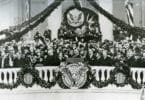John Adams, America’s second president, stands as a testament to the power of principles and intellect in the early governance of the United States. Born on October 30, 1735, in Braintree, Massachusetts, Adams was raised in a modest but intellectually stimulating environment. His father, John Adams Sr., was a farmer and cobbler who also served in local government, instilling in young John a deep sense of civic duty and the importance of education.
Adams exhibited a voracious appetite for knowledge early on, attending Harvard College at sixteen. After graduating, he embarked on a career in law, which quickly intertwined with his burgeoning interest in colonial politics. As tensions between the colonies and Britain escalated, Adams became a staunch advocate for colonial rights, distinguishing himself as a leading voice for independence.
Adams’ contributions to the American Revolution were pivotal. He served on the committee to draft the Declaration of Independence and was instrumental in negotiating the Treaty of Paris, formally ending the Revolutionary War. His diplomatic skills were further showcased during his time as a minister to Britain, where he laid the groundwork for the future relationship between the two nations.
Elected as the first vice president under George Washington and subsequently as president in 1797, Adams inherited a nation fraught with internal divisions and external threats. His presidency was marked by significant challenges, including the infamous XYZ Affair, which strained relations with France and led to the quasi-war at sea. Adams established the Department of the Navy in response, fortifying America’s defense capabilities.
However, the controversial Alien and Sedition Acts marred Adams’ presidency, reflecting the turbulent politics of the era. These acts, intended to suppress dissent and curtail the power of immigrants deemed dangerous to the state, were criticized for infringing on individual liberties and led to a significant decline in Adams’ popularity.
Despite these challenges, Adams’ dedication to American independence and governance never wavered. His decision to pursue peace with France, against the fervor of his party and the popularity of war, likely cost him re-election but demonstrated his steadfast commitment to what he believed was right for the country, showcasing his prioritization of national interest over personal or party gain.
Adams’ life was equally rich, marked by his deep and enduring partnership with his wife, Abigail Adams. Abigail was a trusted advisor and a profound influence on his political life, advocating for women’s rights and education in her extensive correspondence with John. Their letters provide a window into the revolutionary era and the intellectual partnership that significantly shaped John’s life and career.
John Adams passed away on July 4, 1826, the fiftieth anniversary of the Declaration of Independence, a poignant emblem of his lifelong dedication to the United States. His complex and multifaceted legacy reflects the birth pains of a nation striving to define its identity and values.
Reflecting on Adams’ profound impact, we see a leader whose integrity and vision helped steer the early republic through its most vulnerable moments. What lessons can contemporary leaders draw from Adams’ commitment to principle and foresight in governance?
Here are five excellent books for those interested in John Adams’s life and times.
“John Adams” by David McCullough
This Pulitzer Prize-winning biography is arguably the definitive work on John Adams. McCullough provides a vivid and detailed account of Adams’ life, from his early days in Massachusetts to his roles as diplomat and president.
“John Adams: A Life” by John Ferling
Ferling offers an in-depth look at Adams’ entire life, highlighting his complex personality and significant contributions to American independence. This biography is well-regarded for its thorough research and engaging narrative.
“The Letters of John and Abigail Adams”
This collection gives readers an intimate look at John and Abigail Adams’s personal and political partnership. Their correspondence sheds light on the revolutionary era and their daily challenges.
John Adams: Revolutionary Writings 1775-1783″ (Library of America, No. 214) by John Adams
This volume collects Adams’ most important and influential writings from the critical period of the American Revolution, offering insights into his thoughts and policies.
Friends Divided: John Adams and Thomas Jefferson” by Gordon S. Wood
This book explores the complicated friendship and rivalry between John Adams and Thomas Jefferson, providing a dual biography that contextualizes their roles in shaping American history.
These books provide a comprehensive view of John Adams’ profound impact on the United States, from detailed biographical sketches to insights into his most private thoughts and public actions.






